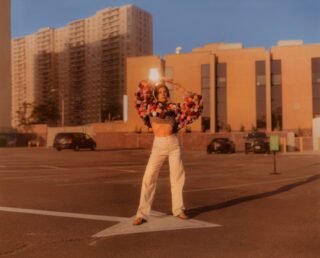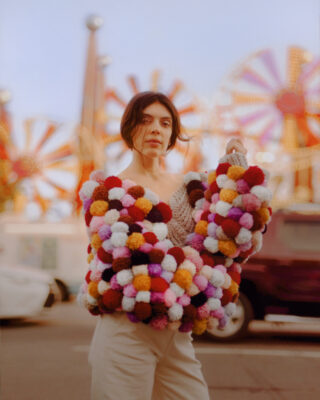Julie Byrne: “Love is not mortal – I really do believe this”
A raw but moving conversation about grief, love and the songwriter's beautiful new LP

A raw but moving conversation about grief, love and the songwriter's beautiful new LP
Julie Byrne is in southern New York State – specifically, Buffalo, where she’s visiting family in the hilltop home in which she grew up. Before she conducts this interview, she takes a short walk to break away from the hubbub of family life to the bottom of that hill where she’s met by a small portion of the Pennsylvania Railroad. It’s a train track that’s mostly barren save for the occasional freight train, transporting paper, coal, steel and the like.
Deserted train lines, surrounded by equally barren, unkempt patches of land (like we’re used to in the UK) can often feel ominous and dystopian, but in this case, it seems serene: birds chirp wistfully; sometimes, and suddenly, the sound of a gentle wind brushes against the microphone of her mobile. “I thought I’d come here to clear my head before our conversation,” she says. It’s her first interview for some time, and the first since the passing of her dear friend and long-term collaborator, Eric Littmann.
To describe this conversation as a ‘promotional’ activity for the contemporary folk songwriter’s latest and best album The Greater Wings (which follows acclaimed predecessors Rooms With Walls and Windows [2014] and Not Even Happiness [2017]) is difficult – inaccurate, even. Even calling it a conversation – an exchange of information between two people – seems limiting somehow.
Sometimes it’s what you don’t say that carries the most meaning; the silences that are often nervously filled but shouldn’t be. So in talking about the process of making her third album, her short and carefully considered responses, as well as the extended periods she spends pondering my questions, tell more that any explicit words could.

Despite the bulk of our often tearful interaction being about the passing of Littmann, the album isn’t about that; it’s not a concept album about sorrow. “Eric would hate for this to become an album that’s all about grieving and loss,” she says, “because that wasn’t who he was, you know?”
It could be described as an album of two halves, the first beginning loose and shapeless in 2017: “The first chords were written around then,” she says. Touring in support of Not Even Happiness set her back a little, and she restarted in 2019, with Littmann. First single ‘Summer Glass’ was written while Byrne was staying with him in his Chicago apartment, which also had a home studio. She’d take walks around Lake Michigan, “obsessively listening to the synth line,” which he had written and played. Recording then continued in New York, with Littmann bringing a portable recording setup in his suitcase, before moving again, this time to LA. Then in 2021, Littmann passed away – and recording ceased.
Byrne returned to the album in 2022, working through grief and her new normal, now with Alex Somers, who took up the production reins, and other musicians who she’d worked intimately with in the past. It was a forced and unplanned adaptation, to say the least. Not only did she have to trust her instincts on how she’d expand her artistic vision, but to fulfil the one her and Littmann had shaped in those embryonic stages.
Yet The Greater Wings in an assured album. It details her journey through grief; the self-titled opener is nothing short of heartbreaking as she sings, “We hold the pact, forever underground / Still rising to sing.” But other songs reckon with other aspects of Byrne’s life. Take ‘Moonless’, an unabashed breakup song. “I’m not waiting for your love,” she sings, as the strings peak and trough; the track is built on the slow piano line (her first time writing on keys). It’s a song about relieving yourself from desiring an unrequited love. “Something I love about being a songwriter, especially as a queer woman,” she says, “is being able to have the last word in my work, becoming myself line by line.” She relishes this sense of agency.
“I’m always moving forwards and backwards – I mean, obviously, grief isn’t linear,” she tells me. Making the album forced her to carefully consider what life is about, what it once was, what it is now, and what it might be in the future, especially when your world has been upended by loss. But while death is inevitable and unchanging, what it engenders is grief, and that is also something that is totally alive and animated. It has all the characteristics of living, breathing feelings: it’s hard, it’s painful, stressful, inconvenient, distracting, permanent, life-altering, shocking. It walks, meandering its way through and within your life.
On ‘Hopes Return’ Byrne sings: “When words were just a reach for some truer knowledge,” because none of these descriptors of grief can do the weight of it justice; the ability to articulate it is probably one of life’s great mysteries. Despite the limitations of words, The Greater Wings is a true masterclass on the special power that artistry can have to articulate, even imperfectly, certain things better than any non-artist could. It’s an album to be filed alongside Sufjan Stevens’ meditations on Carrie and Lowell or Max Porter’s book Grief Is a Thing With Feathers.
Where it differs from those works is in its defiance. Byrne described The Greater Wings as “a love letter to my chosen family and an expression of the depth of commitment to our shared future,” adding that, “it’s a promise to live with the intention that I fiercely count my relationships with the people who are living and the people who have passed on.” Though her statement of her intention for the album is poised, she admits, “it’s hard for me to place [how I feel about it] right now… because it’s something that I’m trying to live out day by day.”
However, one thing is certain for Julie Byrne: “I refuse the idea that Eric is gone now and that a part of me is gone just because he’s gone. It has been my experience in [grief] that love is not mortal… I really do believe this.” In this sense, The Greater Wings is not a break away from her collaboration with Littmann. The essence of what made people fall for Byrne’s previous music is still there – it’s a continued and concerted collaboration with him, unbound by mortality, against the conventional thought that life begins here and ends there.
“I still collaborate with my experience of grief for him,” she says. “The pain is still acute but the memories of him feel alive.” She talks about how she recorded some of her songs from Not Even Happiness in the same childhood bedroom she’s staying in now. She recalls the walks they’d take around the very same railroad that she’s sitting at in this very moment, where they’d dream about their futures. And that future isn’t dead. As she sings on The Greater Wings’ title track: “You’re always in the band / Forever underground / Name my grief and let it sing / To carry you up on the greater wings.”